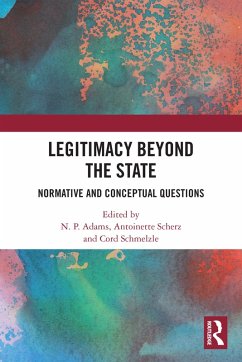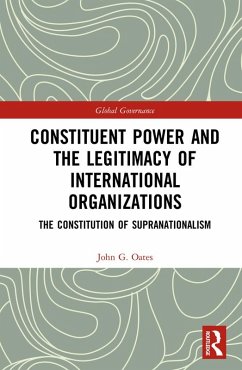
Legitimacy, Accountability and Subsidiarity of the Union's Agencies (eBook, PDF)
Sofort per Download lieferbar
Statt: 15,95 €**
13,99 €
inkl. MwSt. und vom Verlag festgesetzt.
**Preis der gedruckten Ausgabe (Broschiertes Buch)
Alle Infos zum eBook verschenkenWeitere Ausgaben:

PAYBACK Punkte
0 °P sammeln!
Academic Paper from the year 2018 in the subject Law - Comparative Legal Systems, Comparative Law, grade: 7/9, Maastricht University, language: English, abstract: The European Union's regulatory system becomes increasingly more complex and by the incremental amount of competences that are conferred upon it by the Treaties. The traditional partitioning between the Union's legislative institutions sees an increasing mismatch between the ever-larger complexity and specialisation of functions of government, which is not adequately met with an increase in potent administrative instruments these ins...
Academic Paper from the year 2018 in the subject Law - Comparative Legal Systems, Comparative Law, grade: 7/9, Maastricht University, language: English, abstract: The European Union's regulatory system becomes increasingly more complex and by the incremental amount of competences that are conferred upon it by the Treaties. The traditional partitioning between the Union's legislative institutions sees an increasing mismatch between the ever-larger complexity and specialisation of functions of government, which is not adequately met with an increase in potent administrative instruments these institutions could rely upon. One of the methods, the Union has established to counter this expanding problem, is the instalment of agencies which shall provide the law-making bodies with expertise, information and consultation. The principle of subsidiarity has been interpreted in order for the European Union to be delegating powers to these agencies. Agencies are capable of significantly reducing the workload of the legislative capacities while addressing politically or technically difficult or divisive topics and are frequently used in sensitive issues of domestic policy-making. Agencies may also provide expertise in complex policy areas, to integrate or to exclude interest groups into the policy process for different reasons. Judicial-type agencies have advantages on the grounds of quickness, the inclusion of technical expertise, the neutrality in the eyes of interests suspicious of the conventional legal system and their greater degree of public accessibility. These advantages of larger flexibility, speed and ability to choose the composition of the agencies come with potential risks and downsides.
Dieser Download kann aus rechtlichen Gründen nur mit Rechnungsadresse in A, B, BG, CY, CZ, D, DK, EW, E, FIN, F, GR, HR, H, IRL, I, LT, L, LR, M, NL, PL, P, R, S, SLO, SK ausgeliefert werden.













